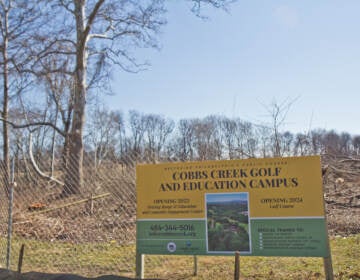Planning Commission hires Eleanor Sharpe to help implement Philadelphia2035

Earlier this month, the Philadelphia City Planning Commission hired Eleanor Sharpe, a former member of the Zoning Code Commission, to serve as its director of legislative and intergovernmental affairs. Sharpe, who has a bachelor’s degree in architecture from Howard University and a master’s in city planning from the University of Pennsylvania, spent the past two years as planning director for the city of New Rochelle, New York. In her new job at the Planning Commission, she’ll be working with City Council and Commission staff to help implement the recommendations of Philadelphia2035, the city’s comprehensive plan.
In a recent conversation with PlanPhilly, Deputy Mayor Alan Greenberger said that the Commission wanted to hire Sharpe with an eye toward getting all City Council members and other stakeholder groups to buy into the district planning and remapping process. Many members of Council, Greenberger said, have worked closely with the Commission on what they see as a beneficial long-term planning process. Some others, notably 3rd-District Councilwoman Jannie Blackwell, have expressed skepticism about the level of transparency and community inclusion in the project.
PlanPhilly put a few questions to Sharpe last week. The questions and answers, edited slightly for clarity, are copied below.
PlanPhilly: What took you away from Philadelphia, and what brought you back?
Eleanor Sharpe: New Rochelle was a fantastic opportunity for me to use my skills and experience in planning and urban design and personally to be closer to my relatives who live in New Rochelle. But frankly, I love this city and its citizens, and felt I had a lot to offer it. I couldn’t turn down the opportunity after investing time and energy into helping rewrite and update the city’s zoning code. It was a remarkable experience to work on the Zoning Code Commission and on a plan that hadn’t been updated in 50 years. By streamlining antiquated regulations that dated back to the Kennedy administration, the new code now transforms the way developers and community groups work together toward a common goal: smart, job-creating and sustainable growth that preserves Philadelphia’s vibrant neighborhoods. Not to mention, my relatives are still within easy travel distance.
I’m honored to be back to be part of continuing to make this city even better than it is now.
PP: You’ll be on the front lines of trying to implement the land use recommendations of the Philadelphia2035 project. Can you tell us more specifically what your duties will be, and what do you think will be the biggest challenge?
ES: I’ll be working closely with PCPC staff, City Council, and other agencies on changes to the City’s zoning maps to better guide development, and on comprehensive-plan recommendations that require collaboration between agencies and investment of public resources. The development of both an updated comprehensive plan and zoning code will transform the way Philadelphia attracts business. Investors and developers will now know exactly what to expect from Philadelphia – a fair and consistent place to do business.
PP: What are your relationships with District City Councilmembers like, and what do you think is the most important thing the Planning Commission can do to involve not just Council but the public in the planning process?
ES: I have wonderful relationships with City Councilmembers I know, and since I just started last week, and am making my way to reintroducing myself to other council members. And I’m looking forward to working with them and finding a way to collaborate for the benefit of their constituents. What’s really incredible about Philadelphia is how engaged its citizens are in the planning process. I’m not sure it’s like this in any other city.
Think of it this way: When I worked on the Zoning Code Commission, we held 50 public meetings, two public hearings in City Council chambers; 36 community-based meetings; seven Stakeholder X-Change meetings; two public meetings to discuss why the Commission adopted, rejected, or modified a group’s proposal; interviews with 125 professional zoning code users; and surveys of nearly 2,000 individuals on components of the proposals. That process alone tells you so much about citizen engagement in Philadelphia. And everyone we met and interacted with fully understood that zoning matters. Planning matters. Design matters because that’s how we shape the places where we live, work and raise our families.
And, I haven’t even gone into the details of the Citizen’s Planning Institute, which I’m sure you’re aware of. But just in case: CPI, as we call it, is the official education and outreach arm of the Planning Department. It educates citizens about planning procedures so they can make informed and effective decisions in shaping their neighborhoods. Since its establishment in 2010, CPI has offered introductory and advanced courses in subjects such as land use, zoning and principles of planning. Well over 100 CPI graduates have already taken their coursework into their communities. These Philadelphia Citizen Planners are making a difference, be it by improving commercial corridors, building parks and gardens, or helping their neighbors understand city processes. Many graduates are currently using their new skills and education to make improvements or plan for change in their community.
I don’t’ know of another city that has anything like CPI. And I just attended a CPI advisory board meeting in which a group of passionate professionals are willing to devote their time to increasing CPI’s reach.
PP: Finally, do you think that Philadelphia has an attitude toward long-term planning that is unique? How does the planning culture here compare to that of other places? Is there anything you’d like to change about how Philadelphians think about city planning?
ES: I want everyone to understand how important planning and zoning is to their lives and the future of the city. Both provide a blueprint for sustainable growth and development. A smart code means smart planning and smart development. If you were a CPI graduate, you’d know that. [The Citizens Planning Institute will begin accepting applications again in the fall.]
WHYY is your source for fact-based, in-depth journalism and information. As a nonprofit organization, we rely on financial support from readers like you. Please give today.





